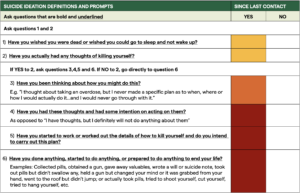The Columbia Suicide Severity Rating Scale (C-SSRS)
Recommended frequency: Manual
Download Sample
Summary
The Columbia-Suicide Severity Rating Scale (C-SSRS) is a standardized, self-report measure, intended to be used as a supportive tool to screen for the presence of suicidal ideation or behavior in an individual. Developed by multiple institutions with support from the National Institute of Mental Health (NIMH), the C-SSRS was the first scale to address the full range of suicidal thoughts and behaviors that indicate increased risk.
While primarily used in acute care settings, the scale has been successfully implemented in many settings, including schools, college campuses, military, fire departments, the justice system, primary care, and for research. The C-SSRS is evidence-based, suitable for all ages, available in over 150 languages, and effectively identifies who needs support and the level of support they need.
About the C-SSRS
The C-SSRS was created in response to a gap in the field identified by a group of researchers from Columbia University, the University of Pennsylvania, and the University of Pittsburgh, who were working together on a NIMH study of treatments to reduce suicide risk among adolescents. The group recognized the need for a singular screening tool that could more precisely assess the full spectrum of thoughts and behavior associated with suicidality, and identify individuals at risk.
The C-SSRS measures two primary components:
- Suicidal Ideation: Assesses thoughts about self-harm or suicide, including severity and frequency.
- Suicidal Behavior: Evaluates past and recent suicidal actions, including attempts, preparatory behaviors, and aborted or interrupted attempts.
The answers help users identify whether someone is at risk for suicide, assess the severity and immediacy of that risk, and gauge the level of support that the person needs. The C-SSRS asks users:
- Whether and when they have thought about suicide (ideation);
- What actions they have taken, and when, to prepare for suicide;
- Whether and when they attempted suicide or began a suicide attempt that was either interrupted by another person or stopped of their own volition.
There are several versions of the Columbia Suicide Severity Rating Scale available for use in clinical practice. The Greenspace platform offers the following two:
- The Lifetime/Recent version to gather lifetime history of suicidality as well as any recent suicidal ideation and/or behavior.
- The Since Last Visit version of the scale assesses suicidality since the client’s last visit.
The C-SSRS has an expansive evidence base, with more than 600 published peer-reviewed studies demonstrating it’s validity and use across various populations. It’s use is supported by SAMHSA, the CDC, the FDA, the NIH, the WHO, and many others. In one study, the C-SSRS had 100% specificity and 100% sensitivity in correctly identifying lifetime actual attempts and 99% specificity and 94% sensitivity in correctly identifying lifetime interrupted attempts that were recorded on the Columbia Suicide History Form. Another study from Sweden found that the C-SSRS “robustly” predicted death by suicide over one-week, one month, and one-year periods.















